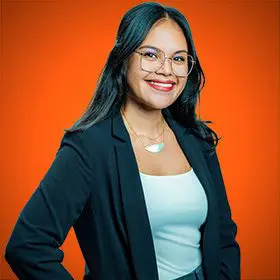Hannah Isabel C. Shai is a PhD student in nutritional sciences at the University of Hawaii. She is a member of Health Policy Research Scholars Cohort 2023.
Tell us a little bit about yourself! What’s the story behind your research interests and why you’re doing the work you’re doing?
Much of my interest in food systems and nutrition is fueled by my lived experiences as a native of the Northern Mariana Islands (NMI). The food environment in the NMI is largely characterized by unhealthy processed and packaged foods, which increase disease risk. The main contributors to our poor food environment include over reliance on imported goods and underinvestment in local agriculture and local food production. This greatly impacts the availability of healthy fresh foods and food cost, highlighting the vulnerability of the food system. As such, our community has less opportunities to adopt and sustain a healthy diet.
For people who may be unfamiliar with your research area, what’s a piece of information that’s important for them to understand?
Solutions aimed at improving diet and nutrition are often focused at the individual level. We place much of the responsibility on individual choices and behaviors. While it is important to measure and address these factors, engaging in those that are at higher levels of the socioecological model are essential. Making healthier, more nutritious food choices requires more than just knowledge and understanding. It requires adequate opportunities and circumstances to make those choices.The most influential factors that we can work to improve are the policies, systems, and environments that can foster more supportive food systems for health.
How do you envision your research contributing towards a Culture of Health? What specific areas or communities are you most passionate about in this regard?
As an NMI native, I experience firsthand the benefits of reciprocity and a culture that thrives in being there for others. For that reason, I owe a lot to the NMI for raising and nourishing me. My vision is a community taking steps toward true prevention by creating a system and an environment in which we can all be better nourished. I am committed to utilizing my research to engage my community in the NMI regarding key issues in our food system. I will ensure that they are central to my research by elevating community voices throughout the process and sustaining important conversations that will help to build a Culture of Health.
Beyond your current research, do you have any long-term goals within your field that you’d like to pursue?
An important long-term goal is to be able to inform the formulation and evaluation of food and nutrition policy in the NMI. I hope to do so in such ways that will promote sustainable and community centered changes. Some key policies include the implementation of our food assistance programs and those aimed at protecting nutrition and health of children. Furthermore, it is a privilege to pursue higher education and I am grateful to those who have built the foundation for me to do so. It is critical to build on this foundation through increased opportunities and mentorship. I aim to continue these efforts in my career and mentor youth in the NMI so they may continue to realize these privileges.
How do you see HPRS complementing your doctoral training?
HPRS will help me to gain and improve skills in policy analysis and leadership. This is critical in the translation of my research to promote equity and systemic change. Another key skill is engaging with formal and nontraditional groups involved in and affected by policy. HPRS will allow me to elevate my research in ways that best support my community and allow me to grow as a leader in my community.
What about HPRS excites you the most? What are you looking forward to as a scholar?
Engaging with others who are just as passionate about health, policy, and equity! It has truly been inspirational and motivating to be around others who share similar visions. HPRS gives me hope for the future and comfort that we are not alone in the commitment to make the communities we love a better, healthier place.
What advice would you offer to aspiring researchers looking to embark on a similar path to yours?
You will gain so much knowledge along the way and there will be countless opportunities, but the most valuable thing is knowing yourself and being faithful to who you are. Let this guide and ground you in your academic and professional journey. How does who you are fuel your purpose? Because passion may get you there, but purpose will get you through.
Let’s wrap up with a fun question: If you could only have one meal for the rest of your life, what would it be and why?
Any meal prepared by my mom! She cooks with love and it is always evident in any meal she prepares. My love for food and nutrition definitely stems from my family. In more ways than one, I have and always will be well nourished.

